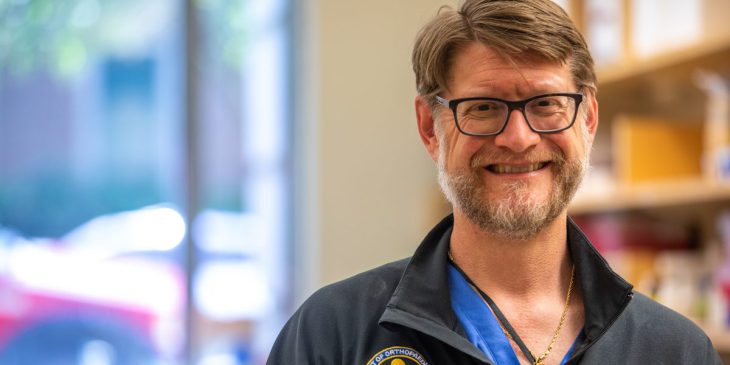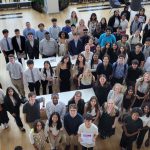For Kurt Weiss, M.D., an osteosarcoma surgeon and researcher at UPMC Hillman Cancer Center, and associate professor of orthopaedic surgery at the University of Pittsburgh School of Medicine, UPMC has always been part of the solution.
In the three decades since a rare cancer turned his life upside down, Dr. Weiss has faced hope and setbacks in his journey from patient to expert surgeon and bar-setting scientist.
As a teenager, Dr. Weiss was diagnosed with osteosarcoma, a cancer that forms in soft tissues and bone. Doctors diagnose about 12,000 people with sarcoma each year in the United States. Of those, only 500 to 700 cases are osteosarcoma. This cancer mainly affects children and adolescents, and the survival rate is between 60% and 70%.
While his treatment journey eventually involved other doctors and specialists from around the country, most of his care was delivered at UPMC.
Between the ages of 15 and 22, Dr. Weiss underwent approximately 25 operations. “I was on the operating table an average of once every three months for seven years,” said Dr. Weiss. Not all the operations were because of the cancer, but rather an attempt to combat a bad infection
Finally, during his junior year of college, he made a life changing decision. “I said to myself: ‘I’m not going to do this anymore.’ I needed to get on with my life and have one more procedure that would amount to a ‘one and done.’” In that final operation, his infected right leg was amputated above his knee.
Over the many years he endured treatment, tests and surgeries, Dr. Weiss saw firsthand how compassionate and confident caregivers make a world of difference. His motivation to become an oncologist and scientist was “without question” impacted by how he was treated as a patient. That, along with a natural desire to learn, inspired him to pursue a career in medicine.
As his medical education progressed, Dr. Weiss intended to work in pediatric oncology. However, a month spent in the field as a medical student proved to be too emotionally and mentally difficult.
“I recognized that it wasn’t going to be the path forward for me, and that was disappointing,” said Dr. Weiss. At the same time, he discovered that he wanted to be a surgeon. “I needed to be the one who was physically going in and removing cancer. That is just the way I was built,” he said.
Now, a typical week for Dr. Weiss includes one day in the operating room, and one day seeing patients clinically. The rest of his time is balanced between working in the lab, attending meetings and connecting and following up with patients. Clinical work fulfills his need to be hands-on with his patients. The scientific side of his career is making waves across the sarcoma community.
As a physician-scientist, Dr. Weiss is passionate about researching for a cure. He helped found the advocacy group Pittsburgh Cure Sarcoma (PCS) to increase awareness and raise research funds. “We’ve been very successful,” he said. “All of this momentum has been building over the past decade. We have a community of scientists constantly working on projects right in Pittsburgh, and we put our funding to good use.”
When a patient is undergoing a type of chemotherapy that Dr. Weiss himself underwent, he knows just a little bit more about the fear, anxiety, and other challenges the patient may be experiencing. The empathy that arises from his memories provides another level of connection. “That may seem like just a little thing, but maybe it is not so little,” Dr. Weiss explained.
Providing this level of care comes naturally to Dr. Weiss, and he knows he is not alone in remembering the human side of his work at UPMC. “It takes so many staff members to look after one patient, and for that I would like to say thank you to everyone. It takes our entire team to take care of the patients I see — many of whom have a severe disease,” he said.
Though his UPMC experience began long ago, Dr. Weiss is grateful to continue to be a part of it: “I was the recipient of such compassionate care as a patient and now I get to be part of this amazing team that does it for other people.”









